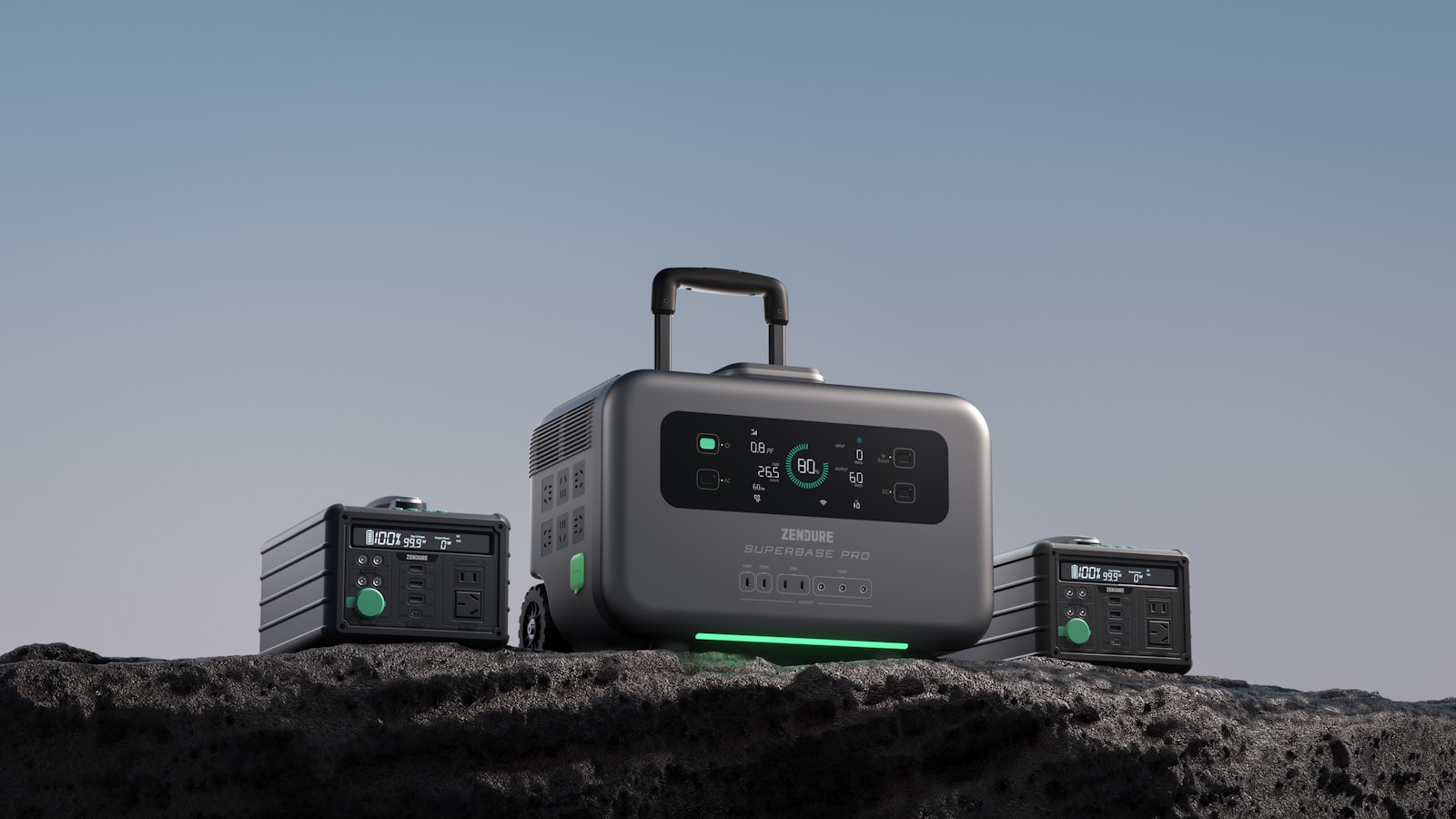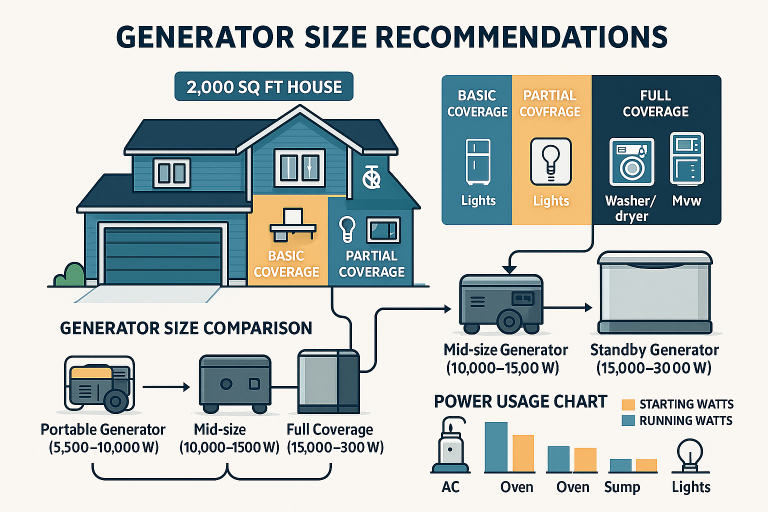Solar Generators vs Gas Generators: Pros and Cons
As the demand for reliable backup power continues to rise—whether for home use, camping, emergency preparedness, or remote work—generators have become essential tools. Among the most popular options are solar generators and gas (or gasoline-powered) generators. Both have distinct advantages and disadvantages depending on the intended use, budget, environmental concerns, and more.
This article explores the key pros and cons of solar generators versus gas generators to help you make an informed decision.
What is a Solar Generator?
A solar generator typically consists of:
- Solar panels (to capture energy from the sun)
- A charge controller
- A battery (to store energy)
- An inverter (to convert DC to AC power)
It’s essentially a portable solar power station that can power small appliances, charge electronics, or even serve as a backup system for homes.
What is a Gas Generator?
A gas generator uses gasoline (or sometimes diesel or propane) to power an internal combustion engine that generates electricity. It’s widely used for both residential and commercial backup power, especially in areas where power outages are common.
Solar Generators: Pros and Cons
Pros
- Eco-Friendly
- Zero emissions during operation.
- Sustainable energy source—uses sunlight, which is free and renewable.
- Quiet Operation
- Solar generators operate silently, making them ideal for indoor use, camping, or nighttime use.
- Low Operating Costs
- No need to buy fuel; sunlight is free.
- Minimal maintenance (no oil changes, spark plugs, etc.).
- Safe for Indoor Use
- No fumes or risk of carbon monoxide poisoning.
- Can be safely used in confined or poorly ventilated areas.
- Easy to Use
- Most units are plug-and-play with minimal setup.
Cons
- Limited Power Capacity
- Usually cannot support heavy-duty appliances like air conditioners, well pumps, or electric heaters.
- Best suited for light or moderate loads (phones, laptops, lights, small refrigerators).
- Dependent on Weather
- Charging depends on sunlight availability; cloudy days or nighttime can slow down or halt charging.
- Slow Charging
- Recharging via solar panels can take several hours or even days, depending on panel size and weather.
- High Initial Cost
- Upfront cost can be higher than a gas generator for similar power output.
- Battery replacements may also be needed every 5–10 years.
Gas Generators: Pros and Cons
Pros
- High Power Output
- Capable of running heavy-duty appliances and whole-house backup.
- Suitable for construction sites, large events, and emergencies.
- Reliable Power Anytime
- Not affected by weather or sunlight.
- Provides instant electricity as long as fuel is available.
- Faster Refueling
- Just add fuel and restart; no need to wait for sunlight or long recharge cycles.
- Wider Availability
- Gas generators are widely available, with many brands, models, and price points.
Cons
- Emissions and Pollution
- Releases carbon monoxide and greenhouse gases.
- Harmful to both the environment and human health.
- Noise
- Gas generators can be very loud—some models reach 70-90 dB, similar to a lawnmower.
- Ongoing Fuel Costs
- Requires constant refueling with gasoline, which can be expensive and scarce during emergencies.
- Maintenance Intensive
- Needs regular oil changes, air filter replacements, and spark plug maintenance.
- Can be prone to mechanical failures if not maintained properly.
- Not Safe for Indoor Use
- Must be operated outdoors due to toxic emissions and fire risk.
Comparison Table: Solar vs Gas Generators
| Feature | Solar Generator | Gas Generator |
|---|---|---|
| Power Output | Low to Medium | Medium to High |
| Emissions | None | High |
| Operating Noise | Silent or very quiet | Noisy |
| Fuel Cost | Free (sunlight) | Ongoing (gasoline/diesel) |
| Maintenance | Minimal | Regular and more complex |
| Indoor Use | Safe | Dangerous |
| Reliability (Weather Dep.) | Weather-dependent | Weather-independent |
| Upfront Cost | Higher | Lower |
| Portability | Lightweight, compact models | Portable but often heavier |
| Charging/Refueling Time | Slow (solar charging) | Quick (refuel with gas) |
Which One Should You Choose?
Choose a Solar Generator if:
- You want an eco-friendly, silent power source.
- You need a safe option for indoor or RV use.
- You don’t need to power large appliances.
- You live in a sunny region and can wait for recharges.
Choose a Gas Generator if:
- You require high power output for multiple or heavy appliances.
- You need power during storms, at night, or in unpredictable weather.
- You don’t mind noise and regular maintenance.
- You have access to sufficient fuel storage.
Hybrid Approach: The Best of Both Worlds
Many users now adopt a hybrid approach—using a solar generator for day-to-day use and lighter loads while keeping a gas generator as a backup for high-power or emergency needs. This strategy combines sustainability with reliability.
Final Thoughts
Both solar and gas generators have a place in modern energy planning. Your best choice depends on your priorities—cost, convenience, environmental impact, power needs, and location. As solar technology advances and prices drop, solar generators are becoming increasingly viable. However, gas generators still hold the advantage for high-demand, immediate power needs.
Whether you go green, stick with gas, or choose both, having a generator today means taking control of your power security.
Would you like this turned into a downloadable PDF or SEO-optimized version for a website?


